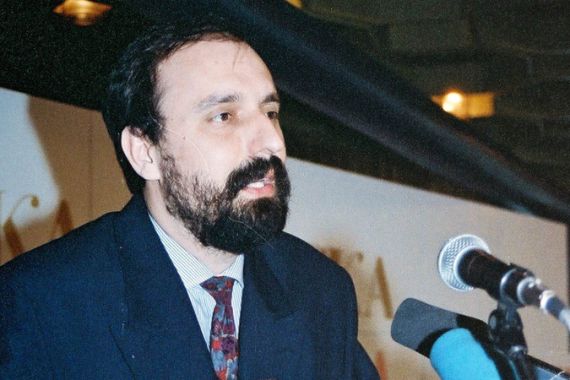Serbia extradites war crimes suspect to Hague
Wartime leader Goran Hadzic arrives in Netherlands to stand trial at war crimes court for former Yugoslavia.

War crimes suspect Goran Hadzic has been extradited to the International Criminal Tribunal for the former Yugoslavia (ICTY) court in The Hague, Netherlands.
The wartime leader of Croatia’s Serbs arrived at Rotterdam airport from Belgrade after Snezana Malovic, the Serbian justice minister, signed the extradition orders early on Friday.
Serbian security officials arrested Hadzic, who was sought for war crimes in Croatia between 1991 and 1995, on Wednesday on a forest road in the Fruska Gora national park region about 65km north of Belgrade.
Hadzic’s lawyer said his client refused his right to appeal against a Serbian court’s decision to transfer him.
Hadzic’s wife, son and sister visited him earlier on Thursday in a detention cell in Belgrade’s court building.
They refused to talk to reporters after the two-hour visit.
EU candidacy
With the arrest of Hadzic after seven years on the run, Serbia has finally fulfilled its obligation to hand over all suspects wanted by the ICTY.
Full co-operation with the court was a key demand of the European Union as Belgrade hopes to get candidacy status and a date to start accession talks later this year.
“Although his extradition was a formality, it happened a little bit quicker than many people had anticipated,” Al Jazeera’s Barnaby Phillips reported from Belgrade airport.
Al Jazeera’s Aljosa Milenkovic, reporting from Belgrade, said that “with the extradition of Hadzic, the path to join the EU lies wide open for Serbia”.
“In the 1990s, when Yugoslavia broke up into seven countries, the future was very uncertain, but every one of those seven countries saw European Union membership as their main goal – as a safe haven against all the bad things that happened in the 90s.
“Now, finally the path is cleared for Serbia to become a member state and it is very eager to accede,” our correspondent said.
“After 20 years, Serbia has broken free from the prison cell that held the country and its people,” Ivica Dacic, the interior minister, told Beta news agency after the arrest.
“The European Union should not blackmail Serbia, there are no reasons to impose (new) conditions on Serbia on the road to European integration.”
Serbian President Boris Tadic was cautious about linking Hadzic’s arrest to EU membership, apparently disappointed at the response from Brussels after Belgrade captured Bosnian Serb ex-army chief Ratko Mladic less than two months ago after nearly 16 years on the run.
But Brussels had hailed the arrest, saying it would boost Serbia’s chances of joining the bloc.
“This is a further important step for Serbia in realising its European perspective and equally crucial for international justice,” Herman Van Rompuy, the EU president, and Jose Manuel Barroso, the European Commission chief, said in a joint statement.
However, Vincent Degert, the head of the EU mission in Belgrade, warned that while “the fundamental obligations were met” much more remained to be done.
He highlighted the need for “internal reforms” and the need for Serbia to conform its legislation to European laws and “regional reconciliation and co-operation”.
Serbia has refused to recognise the 2008 declaration of independence of its breakaway province Kosovo, which has been recognised by a majority of EU member states.
‘Crimes against humanity’
Hadzic, who had been on the run since 2004, was arrested in the mountain region of Fruska Gora near the northern city of Novi Sad.
He has been indicted over the massacre by Croatian Serb troops under his command of 250 Croats and other non-Serbs taken from a hospital in Vukovar after the city fell to Serbian troops following a three-month siege in November 1991.
The 52-year-old faces 14 counts of crimes against humanity and war crimes for the murder of hundreds of civilians and the deportation of tens of thousands of Croats by troops under his command during the 1991 to 1995 Croatian war.
Croatia on Thursday also moved to stake a claim on Hadzic who has been convicted twice in absentia for war crimes and sentenced to jail terms by Croatian courts.
Zagreb also has an outstanding indictment for Hadzic on crimes committed in Vukovar.
Jadranka Kosor, the Croatian prime minister, called on Croatia’s legal institutions to “undertake the necessary measures with the aim of (Hadzic) serving the final sentences … and to voice its readiness to take over prosecution for all war crimes Goran Hadzic stands accused of”.
Legal experts, including Ivo Josipovic, the Croatian president, stressed that the UN tribunal has priority over local courts, but in the past the ICTY has transferred some of its cases to local courts in Bosnia, Croatia and Serbia.